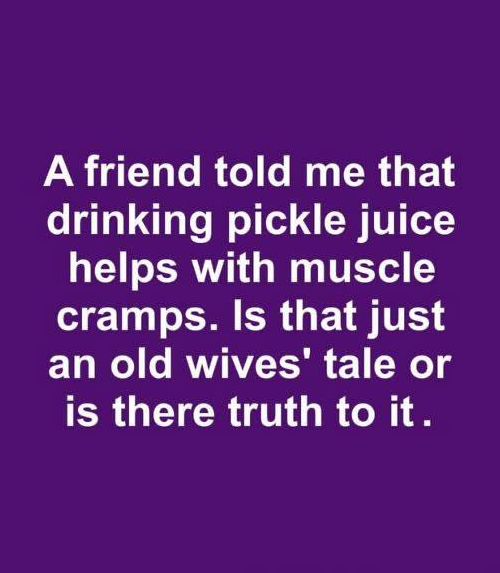What Actually Causes Muscle Cramps?
Before deciding whether pickle juice is truly effective, it’s important to understand why cramps happen in the first place. These painful, involuntary muscle contractions can be triggered by several factors:
Dehydration: When the body lacks fluids, electrolyte balance is disrupted, which interferes with muscle performance.
Electrolyte Deficiency: Low amounts of sodium, potassium, magnesium, or calcium are common culprits.
Muscle Overuse: Exercising without enough recovery time can lead to fatigue and cramping.
Nerve Malfunctions: Problems in the communication between nerves and muscles can also set off spasms.
Finding the underlying cause is essential—but where does pickle juice fit into the picture?
Pickle Juice as a Cramp Fix: How It All Began
Pickle juice gained attention largely in the athletic world. Marathon runners, cyclists, and football players reported that just a few sips brought near-instant relief during intense activity. The theory? Its salty, vinegary composition somehow calms the cramp. But does sodium alone explain it, or is something else happening?
What Science Says About Pickle Juice
Research provides some surprising answers:
Too Fast for Electrolytes: Pickle juice works far more quickly than electrolyte replacement would allow. It can’t restore sodium and potassium levels in seconds.
Neurological Interruption: The vinegar (acetic acid) in pickle juice appears to activate receptors in the mouth and throat, which send signals that override the misfiring nerves behind muscle cramps. In short, it may “reset” the cramp at its source.
How to Use Pickle Juice for Quick Relief
If you want to give it a try, here’s what athletes recommend:
Stick to Small Servings: Two or three ounces are enough—straight from the pickle jar or a pre-bottled product.
Act Fast: Drink it immediately once a cramp starts.
Wait and Watch: Many report relief in less than a minute.
It’s generally safe, but due to its high sodium, it’s best used occasionally rather than daily.
Who Might Benefit the Most?
Pickle juice tends to help people in certain situations:
Sports and Workouts: Endurance athletes often use it during or after training.
Night Cramps: Those who wake up with painful leg spasms may keep some by the bed.
Low Sodium Levels: In rare cases, it offers quick relief when sodium is the issue.
Still, it won’t fix chronic cramps caused by deeper health conditions.
Other Remedies Beyond Pickle Juice
If you’re not a fan of drinking brine, these approaches also help prevent or ease cramps:
Drink plenty of water to stay hydrated.
Try sports drinks for balanced electrolytes.
Stretching muscles gently at the first sign of tension.
Magnesium supplements if deficiency is suspected.
Eating bananas or other potassium-rich foods for natural support.
Possible Downsides to Keep in Mind
Though helpful, pickle juice isn’t for everyone:
High Salt Levels: Risky for people with hypertension or low-sodium diets.
Acidic Impact: Can worsen acid reflux or upset sensitive stomachs.
Dental Concerns: Frequent exposure to acidic liquids may erode enamel.
Final Thoughts: Old Myth or Real Medicine?
So, does pickle juice truly stop cramps? Evidence suggests yes—but not because it restores electrolytes. Instead, it likely disrupts nerve activity that triggers muscle spasms.
For athletes and those struggling with nighttime cramps, it’s an inexpensive, practical trick worth trying. Still, lasting prevention depends on hydration, nutrition, and addressing any underlying health concerns.
